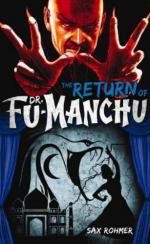The Gables was a roomy and rambling place lying back a considerable distance from the road. A semicircular drive gave access to the door, and so densely wooded was the ground, that for the most part the drive was practically a tunnel—a verdant tunnel. A high brick wall concealed the building from the point of view of any one on the roadway, but either horn of the crescent drive terminated at a heavy, wrought-iron gateway.
Smith discharged the cab at the corner of the narrow and winding road upon which the Gables fronted. It was walled in on both sides; on the left the wall being broken by tradesmen’s entrances to the houses fronting upon another street, and on the right following, uninterruptedly, the grounds of the Gables. As we came to the gate:
“Nothing now,” said Smith, pointing into the darkness of the road before us, “except a couple of studios, until one comes to the Heath.”
He inserted the key in the lock of the gate and swung it creakingly open. I looked into the black arch of the avenue, thought of the haunted residence that lay hidden somewhere beyond, of those who had died in it—especially of the one who had died there under the trees— and found myself out of love with the business of the night.
“Come on!” said Nayland Smith briskly, holding the gate open; “there should be a fire in the library and refreshments, if the charwoman has followed instructions.”
I heard the great gate clang to behind us. Even had there been any moon (and there was none) I doubted if more than a patch or two of light could have penetrated there. The darkness was extraordinary. Nothing broke it, and I think Smith must have found his way by the aid of some sixth sense. At any rate, I saw nothing of the house until I stood some five paces from the steps leading up to the porch. A light was burning in the hallway, but dimly and inhospitably; of the facade of the building I could perceive little.
When we entered the hall and the door was closed behind us, I began wondering anew what purpose my friend hoped to serve by a vigil in this haunted place. There was a light in the library, the door of which was ajar, and on the large table were decanters, a siphon, and some biscuits and sandwiches. A large grip stood upon the floor, also. For some reason which was a mystery to me, Smith had decided that we must assume false names whilst under the roof of the Gables; and:
“Now, Pearce,” he said, “a whisky-and-soda before we look around?”
The proposal was welcome enough, for I felt strangely dispirited, and, to tell the truth, in my strange disguise, not a little ridiculous.
All my nerves, no doubt, were highly strung, and my sense of hearing unusually acute, for I went in momentary expectation of some uncanny happening. I had not long to wait. As I raised the glass to my lips and glanced across the table at my friend, I heard the first faint sound heralding the coming of the bells.




